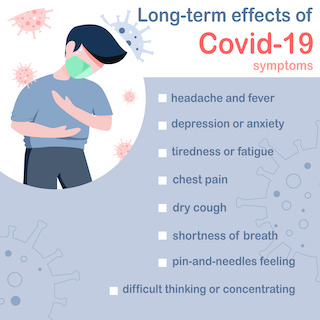Post-COVID-19 sequelae of the respiratory system. A single-centre experience reporting the compromise of the airway, alveolar and vascular components

Accepted: October 3, 2022
All claims expressed in this article are solely those of the authors and do not necessarily represent those of their affiliated organizations, or those of the publisher, the editors and the reviewers. Any product that may be evaluated in this article or claim that may be made by its manufacturer is not guaranteed or endorsed by the publisher.
Authors
The long-term sequelae of COVID-19 have now become more common and appreciable. The SARS-CoV-2 virus can cause a variety of infectious and non-infectious pulmonary complications. The purpose of this study is to raise awareness about post-COVID-19 pulmonary sequelae, both infectious and non-infectious, in this geographical area. A retrospective study was conducted from July 1st 2020 to December 20th 2020. A total of 1200 patients were evaluated, with 83 suffering from post-COVID-19 pulmonary complications. The patients' mean age was 62 years (IQR 55-69), with 63 (75.9%) being male. The most common co-morbid illnesses were hypertension (49, 59%) and diabetes (45, 54.2%). The majority of them (37, 44.6%) had severe COVID-19, followed by critical COVID-19 (33, 39.8%). There was no statistically significant difference in recurrence of respiratory symptoms or duration of current illness between non-severe, severe, and critical COVID-19 patients. Non-infectious complications were observed in the majority of patients (n=76, 91.5%), including organizing pneumonia/ground glass opacities in 71 (88%) patients, fibrosis in 44 (55%), pulmonary embolism in 10 (12.5%), pneumomediastinum in 6 (7.4%) and pneumothorax in 7 (8.6%). Infective complications (25, 30.1%) included aspergillus infection in 10 (12.0%) and bacterial infection in 5 (8.47%), with more gram-negative infections and one patient developing Mycobacterium tuberculosis. Post COVID-19 mortality was 11 (13.3%). The long-term pulmonary sequelae of COVID-19 are not rare. Cryptogenic organizing pneumonia, ground glass opacities, and fibrosis were common post-COVID-19 sequelae in our patients. This necessitates frequent close monitoring of these patients in order to initiate early appropriate management and prevent further morbidity and eventual mortality.
How to Cite

This work is licensed under a Creative Commons Attribution-NonCommercial 4.0 International License.
PAGEPress has chosen to apply the Creative Commons Attribution NonCommercial 4.0 International License (CC BY-NC 4.0) to all manuscripts to be published.
Similar Articles
- Nian Patel, Robert Nicolae, Georgios Geropoulos, Pallabhi Mandal, Chrysanthos D. Christou, Marianna Gavala, Nikolaos Madouros, Michail Papapanou, Rahul Mogal, Dimitrios Giannis, Konstantinos S. Kechagias, Nikolaos Panagiotopoulos, Pneumomediastinum in the COVID-19 era: to drain or not to drain? , Monaldi Archives for Chest Disease: Vol. 93 No. 2 (2023)
You may also start an advanced similarity search for this article.

 https://doi.org/10.4081/monaldi.2022.2412
https://doi.org/10.4081/monaldi.2022.2412




